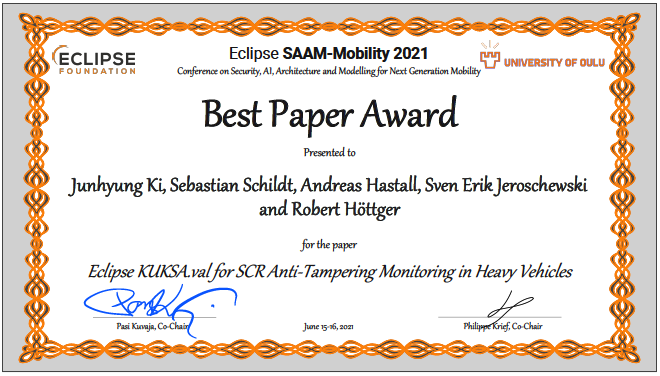Eclipse SAAM Mobility 2021
Security, AI, Architecture and Modelling for Next Generation Mobility
Virtual Conference | June 15 - 16, 2021
Virtual Conference | June 15 - 16, 2021
Increasingly autonomous, connected, intelligent and sustainable mobility in the future societies requires drastic software innovations that cross several research and innovation domains. This contributes to the rapid digitalization of contemporary societies. Current scenarios are characterized by constantly increasing demands of managing complex software constellations, rapid development cycles, while retaining high quality requirements for functional and non-functional requirements alike. A multitude of novel technologies – such as Edge Computing, Artificial Intelligence, Big Data Analytics, Digital Twins, and Security, Privacy, and Trust Schemes – are being investigated in order to be adopted in the current ecosystem-wide arrangements, standards, and tool chains. The role of open source software and tool chains, such as OpenADx, is also emerging powerfully. Hence, designing, managing, and governing the next generation systems, software and services for the future autonomous and connected mobility solutions is set to become even more complex.

Security and Privacy for Mobility

Artificial Intelligence for Mobility

Architecture for Mobility

Modelling for Mobility
Note:
Security icon by Fauzan Adiima, from the Noun Project
Artificial Intelligence icon by priyanka, from the Noun Project
Architecture icon by HeadsOfBirds from the Noun Project
Tree icon by Gacem Tachfin, from the Noun Project
We are pleased to announce that the SAAM Mobility Best Paper Award for 2021 has been awarded to Junhyung Ki, Sebastian Schildt, Andreas Hastall, Sven Erik Jeroschewski and Robert Höttger for their paper on ‘Eclipse KUKSA.val for SCR Anti-Tampering Monitoring in Heavy Vehicles’.

The Eclipse SAAM Mobility 2021 conference is co-organized by the Eclipse Foundation and the University of Oulu.
Pasi Kuvaja, Professor Emeritus, University of Oulu, Finland
Philippe Krief, Eclipse Foundation Europe, France
Tero Päivärinta, University of Oulu, Finland
Teemu Karvonen, University of Oulu, Finland
Susan Iwai, Eclipse Foundation Europe, Germany